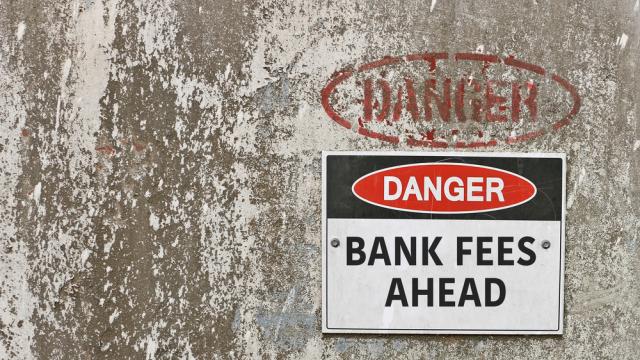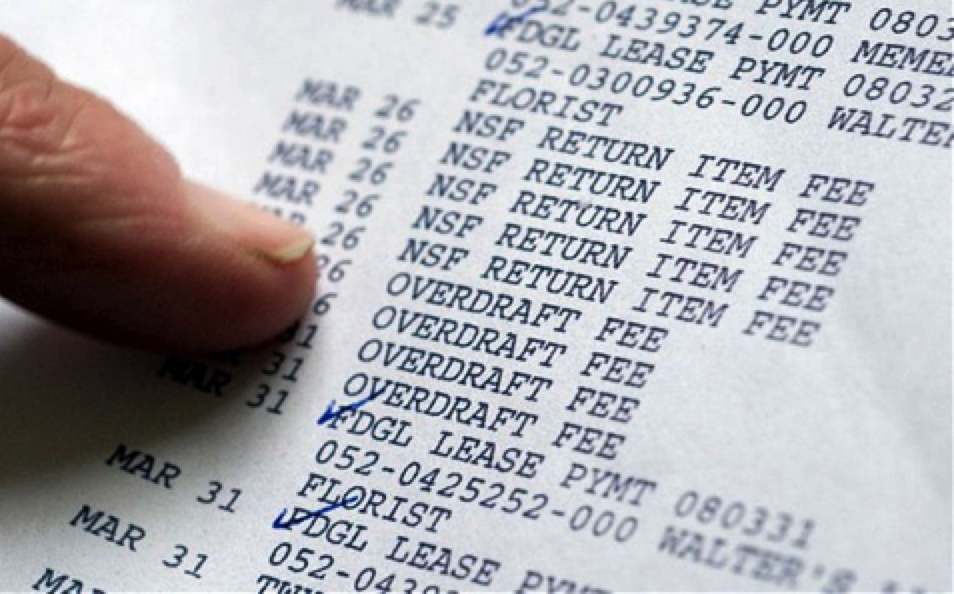
The Big Three banks – JP Morgan Chase, Wells Fargo and Bank of America – raked in an astonishing $6.4 billion in overdraft fees alone last year. Stop a moment and think about that: Each overdraft, on average, costs customers $35, an amount that gets multiplied with each subsequent purchase no matter how small.
We're talking about the world's most bloated financial giants growing even fatter and richer off the backs of people who are already broke, by charging them additional fees for money they already lack. Specifically in 2017, that meant about 183 million charges of $35.
How the Big Banks Justify Their Fees
Banks charge all kinds of fees, costing consumers billions of dollars annually just to access their own money. Ironically, or perhaps not, the bigger the bank, the more fees they typically charge.
Common types of bank fees include account maintenance fees, ATM fees, debit card and debit card replacement fees, early withdrawal fees, insufficient funds fees and teller fees in addition to overdraft fees. Given the number of fees banks charge you just to access your own money, the old method of stashing cash under the mattress may seem ever more appealing – especially since most banks now pay 0% interest on the money you keep in your checking account.
Of course, banks justify their exorbitant fee charges under the premise that they need the money for operating costs and in order to stay profitable. Yeah, sure. When you consider the fact that American banks raked in a record $171.3 billion in profit last year, their fees begin to look less like an attempt to stay profitable and more like a ruthless gouging of the customers who keep them in business.
Symptom of a Larger Disease in Our Society?
In America, cash is king, and those who have it are idolized as demi-gods. One need only look to the 2016 presidential election where Donald Trump, a businessman with zero political experience or knowledge, was elected. In our nation, those with money are perceived to be stronger, more competent and more intelligent than those without it, though the perception couldn't be further from the truth.
A nation's public policies reveal its character, and right now America's character is defined by unadulterated greed. Despite the fact that past deregulation of the banks led to not one, but several, deep recessions once the inevitable financial crash occurred, under the Trump administration banks are nonetheless being deregulated even further.
Attacking the Dodd-Frank Act with relentless fury, Congressional Republicans and the Trump administration have already overturned several Obama-era regulations protecting consumers from predatory lending practices – such as the mortgage lending practices that prevented banks from signing up consumers for balloon mortgages they couldn't possibly afford.
Even in the wake of the Equifax breach, where the data of millions of taxpayers was put at risk of identity theft, the current Congress and administration have worked tirelessly to dismantle the Consumer Financial Protection Bureau, the one institution where consumers can still report breaches of personal data and many other types of fraud carried out by financial institutions.
Clearly, our American fixation on wealth is leaving those with little of it further and further behind. The deregulation of banks only makes it harder for people with less money to catch up and rise out of poverty.
What You Can Do Now to Avoid Being Gouged
It remains unlikely that our current congress and president will take any action to protect consumers from predatory banks, but the 2018 midterms are fast approaching and much could change. Sen. Bernie Sanders proposed in his 2016 presidential campaign to break up the big banks, and while Sanders alone cannot fix the problem, should Democrats flip the Senate in November, the Vermont senator would become chair of the Senate Budget Committee, opening up all kinds of new opportunities.
Even so, true banking and financial reform could take years. In the meantime, it is critical to protect yourself against predatory banking policies. That said, the single best thing you can do to protect yourself as a bank customer is to put your money in an institution that values you as an individual. Instead of going to one of the big banks, open a checking or savings account with a smaller, local credit union. Not only do credit unions often charge far lower fees for things like mortgages and car loans, but they're also more flexible if and when you mistakenly overdraw on your account.
Many good credit unions allow consumers to choose whether or not debit card purchases will be covered with an overdraft fee, or whether to simply have the card declined, costing the consumer no additional fees. Credit unions also have some of the best savings interest rates.
Finally, many smaller banks will refund overdraft fees as a one-time courtesy if an overdraft happens only once every six months. Don't be shy about contacting your bank and asking for at least a partial reversal of fees. And when it comes to getting a loan, shop around and take your time finding the best rate and plan that will work for your budget.
When it comes to banking with the worst financial corporations, there is always an alternative. It is up to us, the consumers, to keep our money where it belongs: in our hands, not Wall Street's.
3 WAYS TO SHOW YOUR SUPPORT
- Log in to post comments












